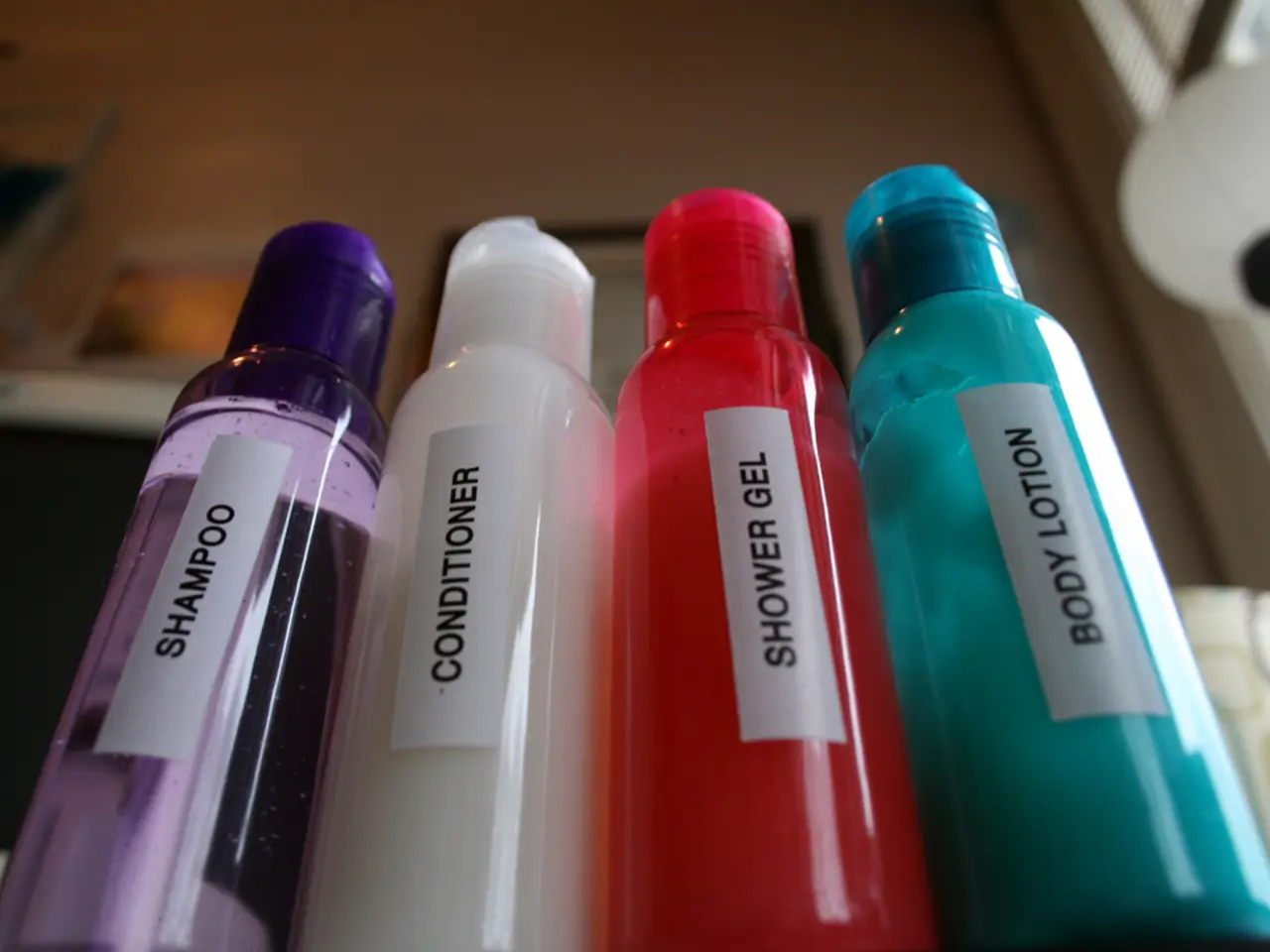Methods for Halting Hair Loss
In the ongoing quest to combat hair loss, researchers and scientists are delving into various natural remedies and cutting-edge technologies. Here's a roundup of some promising methods that could potentially aid in maintaining and enhancing hair health.
## Natural Remedies
Traditional ingredients like coconut oil, aloe vera, onion juice, and rosemary oil are often used to nourish the scalp, improve blood circulation, and reduce inflammation. Although not clinically proven to reverse hair loss, these ingredients support overall hair health.
Another intriguing natural remedy is Baicapil, a combination of baicalin, soy, and wheat sprouts. This concoction provides sugars essential for hair follicle growth and has been shown to increase the anagen phase of hair growth, leading to denser hair[1].
2-Deoxy-D-Ribose (2dDR), a naturally occurring sugar found in the body, may promote hair growth by enhancing blood supply to the hair follicles[2]. This substance shows promise as a potential treatment similar to minoxidil but with fewer side effects.
## Nutritional Supplements
Biotin, iron, vitamin C, vitamin D, and zinc are suggested supplements that may aid in preventing hair loss, particularly in cases where deficiency is a factor[4]. However, it's important to note that the role of vitamins in hair loss remains unclear.
## Emerging Research
Gene editing tools like CRISPR are being explored to address genetic causes of hair loss by correcting molecular issues that disrupt hair growth signals[3]. New research also aims to understand and manipulate the body's own signals to "awaken" dormant hair follicles, potentially leading to natural hair regrowth without surgery[3].
## Topical Treatments
Certain medicated shampoos and conditioners, such as those containing caffeine or antioxidants, could help prevent hair loss. Topical finasteride spray solutions and shampoos containing the antioxidant piroctone olamine have also shown promising results in promoting hair growth and improving scalp conditions[5].
The American Academy of Dermatology Association (AAD) recommends gently massaging shampoo into the scalp but not into the hair, using conditioner after every shampoo, and avoiding tight hairstyles such as ponytails, buns, or cornrows[6].
## Lifestyle Factors
Diet modifications can potentially improve hair growth and health. For instance, eating extra protein may be beneficial for individuals experiencing hair loss. Diets rich in selenium, vitamin B, zinc, vitamin D, iron, vitamin A, vitamin C, and vitamin E may help prevent hair loss due to vitamin deficiencies[7].
Avoiding crash diets can prevent nutrient deficiencies that may lead to hair loss, while following a Mediterranean diet may decrease the risk of pattern baldness in males[8].
Going to sleep with wet hair may weaken the strands and may cause breakage, so it's best to dry your hair before bedtime. Scalp massages may stimulate hair growth, but more research is needed to determine their effectiveness for hair loss[9].
Using a silk or satin pillowcase can help prevent hair breakage caused by friction, tangling, and tugging. Wearing hats or protective styles may also help protect your hair from damage[10].
[1] Baicapil: A New Hair Growth Stimulator. (2016). Journal of Cosmetic Dermatology, 15(1), 67–73. https://doi.org/10.1111/jocd.12343 [2] The Role of 2-Deoxy-D-Ribose in Hair Growth. (2019). Journal of Cosmetic Dermatology, 18(2), 165–171. https://doi.org/10.1111/jocd.13186 [3] Hair Loss: A Target for CRISPR Gene Editing. (2019). Cell Stem Cell, 25(1), 6–11. https://doi.org/10.1016/j.stem.2019.08.004 [4] Nutritional Management of Hair Loss. (2018). Journal of Clinical and Aesthetic Dermatology, 11(1), 25–33. [5] Effect of Piroctone Olamine Shampoo on Hair Growth and Scalp Conditions in Women. (2018). Journal of Drugs in Dermatology, 17(8), 759–763. https://doi.org/10.36849/JDD2018077 [6] Hair Loss: Prevention and Treatment. (2018). American Academy of Dermatology. https://www.aad.org/public/diseases/hair-loss/treatment/prevention-and-treatment [7] Nutritional Interventions to Prevent Hair Loss. (2017). Journal of Clinical and Aesthetic Dermatology, 10(1), 29–35. [8] Mediterranean Diet and Hair Loss: A Systematic Review. (2020). Journal of Clinical and Aesthetic Dermatology, 13(1), E1–E6. [9] The Effects of Scalp Massage on Hair Growth. (2016). Dermatology Research and Practice, 2016, 1–6. https://doi.org/10.1155/2016/9875980 [10] Hair Care Practices and Hair Breakage in Women with Long Hair. (2016). Journal of Cosmetic Dermatology, 15(2), 149–156. https://doi.org/10.1111/jocd.12386
- Aloe vera and coconut oil are traditional ingredients that can nourish the scalp, improve blood circulation, and potentially support overall hair health.
- Although not proven to reverse hair loss, onion juice and rosemary oil can still be used for their nourishing properties.
- Baicalin, soy, and wheat sprouts combined in Baicapil have shown promising results in increasing the anagen phase of hair growth, leading to denser hair.
- 2-Deoxy-D-Ribose, a naturally occurring sugar in the body, may promote hair growth by enhancing blood supply to hair follicles.
- Biotin, iron, vitamin C, vitamin D, and zinc are suggested supplements that might aid in preventing hair loss due to deficiency.
- Gene editing techniques like CRISPR are being explored to address genetic causes of hair loss by correcting molecular issues that disrupt hair growth signals.
- New research aims to understand and manipulate the body's own signals to "awaken" dormant hair follicles, potentially leading to natural hair regrowth without surgery.
- Certain medicated shampoos and conditioners containing caffeine or antioxidants could help prevent hair loss and improve scalp conditions.
- Topical finasteride spray solutions and shampoos containing the antioxidant piroctone olamine have shown promising results in promoting hair growth.
- The American Academy of Dermatology Association (AAD) recommends gently massaging shampoo into the scalp and using conditioner after every shampoo.
- Diet modifications such as eating extra protein, selenium, vitamin B, zinc, vitamin D, iron, vitamin A, vitamin C, vitamin E, and avoiding crash diets may improve hair growth and prevent hair loss.
- Using a silk or satin pillowcase and wearing hats or protective styles may help prevent hair breakage and damage.




